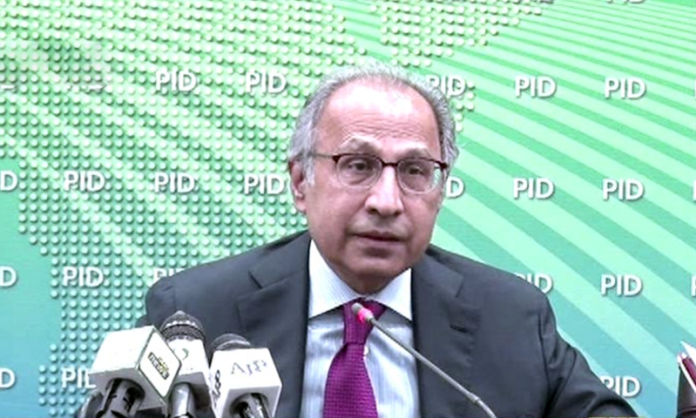ISLAMABAD: The government on Wednesday removed PM’s Adviser on Finance Dr Abdul Hafeez Sheikh as a member of the 10th National Finance Commission (NFC) and issued a new notification on the composition of members.
The government made the decision after opposition from provinces and Balochistan High Court’s (BHC) verdict against the composition of the NFC.
Shaikh being the finance adviser cannot chair the NFC, since under the constitution only the finance minister can chair the commission. In case of absence of the finance minister, the prime minister being the minister in-charge has to chair NFC’s meetings.
Moreover, in addition to NFC’s composition, previous ToRs were also restored, since the new ToRs gave the Center a higher share in NFC without making any constitutional amendments.
Earlier on May 19, Pakistan Muslim League-Nawaz (PML-N) leader Khurrum Dastagir had challenged the formation of 10th NFC in the Islamabad High Court (IHC).
On June 24, the BHC had annulled the notification issued by President Arif Alvi for the constitution of the 10th NFC, ruling that the appointment of NFC members was not in accordance with the constitution.
As per the constitution of 10th NFC notified in May 2020, the government had introduced some new ToRs in the new NFC, which were not part of the previous commissions. These included assessment and allocation of resources to meet expenditures made on security and natural disasters and calamities. Another addition made to the ToRs was the assessment of total public debt and allocation of resources for its repayment.
The joint opposition had recently also rejected a motion in Senate moved by Muttahida Qaumi Movement (MQM) Senator Muhammad Ali Saif regarding a constitutional amendment bill for lifting the cap on NFC Award and providing a share of resources to provinces not less than what they got under the previous NFC Award. The MQM senator also wanted distribution of resources as per the current needs of the provinces.
As per the new composition of the NFC notified by the Finance Division on Wednesday the finance minister will chair the commission while finance ministers of four provinces will be members of the commission.
Other members include Tariq Bajwa from Punjab government, Dr Asad Sayeed from Sindh government, Musharraf Rasool Cyan from KP government and Dr Kaisar Bengali from Balochistan government.
Under the existing NFC arrangements, provinces get a 57.5 per cent share of the Federal Divisible Pool (FDP) while the federal government gets a 42.5 per cent share.
According to Article 160 of the constitution, after every five years the president has to constitute the NFC for a period of five years.
While the 8th and 9th NFC remained inconclusive, the revenue distribution mechanism set under the 7th NFC Award under the Pakistan People’s Party (PPP) government in 2010 would be extended to the new NFC.
IHC DISPOSES PETITION:
Meanwhile, a two-member bench of the IHC presided by Justice Amir Farooq disposed of Dastagir’s petition after Attorney General of Pakistan (AGP) Khalid Jawed Khan informed the court that the government had issued a new notification regarding the NFC’s formation.
“The first notification has become ineffective,” said the AGP. “Now this notification is on the field. The financial adviser has not been included in the commission.”
The AGP further added that the terms of references (TORs) against the formation of NFC have also been changed. “I also objected to the notification of the formation of the old Finance Commission,” he added.
Justice Amir Farooq told the petitioner that the new notification, which was challenged, was withdrawn by the government and the petition was complied with. After the new notification of the commission, the PML-N leader’s petition became ineffective.
Addressing reporters after the hearing, Dastagir’s lawyer and PML-N leader Mohsin Shahnawaz Ranjha said that their objection was that NFC was formed without their consultation. “It is our achievement that we forced the government to work according to the constitution,” he added.





52.5 /4 provincial governments = 13.1%, while federal government gets to keep 42.5%.
What is share of local governments, i.e, union councils, municipal government etc.?
Please enlighten all Pakistani citizens!